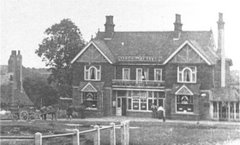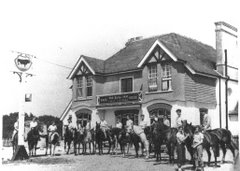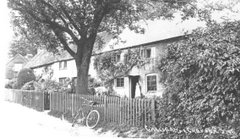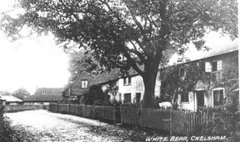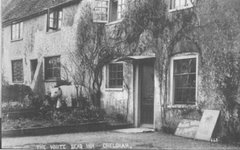The Grasshopper, Tatsfield
I recently received an interesting communication from a
reader which I thought to share here.
He wrote:“I began
researching my family history when I was a child, speaking to my Granddad – I
was born in Redhill Hospital and brought up in Oxted. He always said that my
ancestors ‘ran pubs’ and when I become a bit more serious about genealogy about
15 years ago this was borne out by my research. My Great Grandfather William
George Church and his wife Annie Louisa (nee Westbrook) ran the Wheatsheaf Inn
in Old Oxted at the end of the 19th Century (1891 census), and my
Great-Great-Grandfather Reuben Robert Church was the landlord of the
Grasshopper Inn at Moorhouse, Tatsfield near Westerham from about 1885 until
his death in 1904. I have found his will and his entire estate of £155 (worth over
£17,000 in today’s money!) all went to Granville Charles Gresham Leveson Gower,
who I believe owned the pub. I would like to know why the considerable estate
did not go to Reuben’s descendants – was there a debt to be repaid or some
other reason? I have not found the answer to this question yet.
These ancestors were
originally from Netteswell in Essex (now part of Harlow new town) where my
Great-Great-Great Grandfather Thomas Bray ran the Greyhound Inn (which I have
visited as it still exists, sat rather incongruously on the old village green
amongst the brutal architecture of Harlow). The earliest connection I have
found in my family tree to running a pub is Reuben’s grandfather (and my 4th
Great-Grandfather) Daniel Coleman (1754 – 1819) who was recorded as a licenced
victualler in his will, I presume in Netteswell (possibly of the Greyhound pub,
although this isn’t specified in the will).
I discovered that
Reuben (he anglicised his name to Robert for some reason) and his wife Eliza
(nee Bray) divorced in 1893 (which was quite a surprise as this was almost
unknown at the time) and from the divorce petition that they lived in Penge,
Norwood in between their time in Netteswell and moving to Tatsfield. I presume
their relocation was related to the licenced victualler trade they were in, but
have not yet found any evidence for this nor which pub they ran in Penge.”
If any historians out there can shed any light, your observations would be most welcome!




